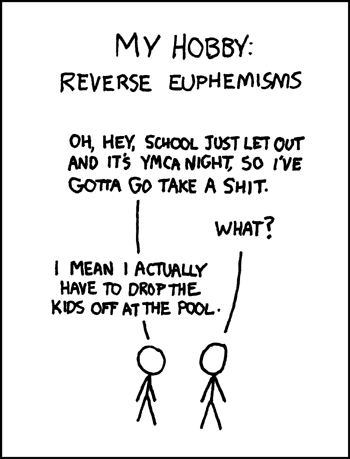 What is a reference? For a software engineer, that’s a language construct that takes you to a certain place in the computer’s memory. You may have multiple references to that place. They may even be called differently, or describe said place in different terms; if they get you to the exact same place, you can safely say they are equivalent1. They have, if you will, different forms, but the same underlying meaning. References are a programmer’s euphemism, and in this context they’re quite useful, too.
What is a reference? For a software engineer, that’s a language construct that takes you to a certain place in the computer’s memory. You may have multiple references to that place. They may even be called differently, or describe said place in different terms; if they get you to the exact same place, you can safely say they are equivalent1. They have, if you will, different forms, but the same underlying meaning. References are a programmer’s euphemism, and in this context they’re quite useful, too.
Which is not something I would care to say about the euphemisms in the natural language.
At best, euphemism is metaphor’s retarded cousin. And justifiably so, because a metaphor still leaves some room for the imagination, whereas with an euphemism everyone knows what you intend to say. Semantically, it doesn’t make any difference if you replace ‘hell’ with ‘heck’ each and every time. Rest assured, people will know what you mean. We just do the reverse substitution in our head. You know you’re swearing, we know you’re swearing, so why pussyfooting around that one four-letter word? It may have sounded cute in kindergarten, but you’re an adult now. Either assume your fucking swear words or refrain from swearing at all.
There are only a few valid reasons for employing an euphemism instead of the actual word. The most remarkable is the use of formal or diplomatic language, which is almost as precise as a programming language in nuances and accents. Given that this code was born out of the necessity to communicate a monarch’s wishes to his hated adversary while kneeling within decapitation range, it is no wonder that those glorified messengers tried to convey as little offence as possible. Therefore obscenities and profanity are simply not included in this highly specialized construct. You have to admit though, they would have ensured substantially juicier WikiLeaks disclosures.
Another reason is speaking in front of children. This is still a valid use in my view, because children typically assume and repeat adult behaviour without completely understanding it, which can lead to them being hurt or shunned for no reason. An adult can be reasonably expected to assume responsibility for his utterances – that is, barring exonerating circumstances such as acute Tourette’s syndrome. It is not fair to ask the same of children, especially when they do not discern the true significance and weight that society places on such words.
Other than that? I do not see the point. I’m certainly not advocating swearing like a sailor in polite conversation, but if you feel like swearing either abstain or do it properly. ‘Piddle’ is not currently registered as a swearword. Neither is ‘poppycock’.
Come to think of it, some of the most used swear words of today have begun their career as euphemisms. How sad is that? The aforementioned ‘hell’ is actually an euphemism for ’underground’. In the Norse mythology, Hel is Loki’s daughter, and she’s in charge of – who would have guessed? – Nilfheim, the lowest of all worlds, apparently also populated with evil dead. ‘Cock’ means what you expect, a male mature bird, but it also denominated the firing mechanism on muskets. The expression ‘going around half-cocked’ comes from this latter context, and it actually means having a weapon that is not ready to fire. As for ‘fuck’, the word every prude loves to hate, its original meaning was ‘to thrust’, which explains rather neatly why it was so suitable for describing – euphemistically, of course – the act of sexual intercourse2.
In fact, I have recently encountered said word it in quite polite company. It was used in Jack Vance’s 1966 Nebula award winning novella, ‘The Last Castle’3, from which I’d like to quote the full paragraph:
Xanten looked up toward the heavens, kicked at the turf. He drew a deep breath and approached to Glys Meadow-sweet. He noted that she had fucked a flower into her long loose hair.
After a second or two she looked up and searched his face.
“Why are you so angry?”
Xanten slapped his thigh, seated himself beside her.
” ‘Angry’? No. I am out of my mind with frustration. […]”
Jack Vance has a keen interest in language; in fact, languages take centre stage in another one of his masterpieces, ‘The languages of Pao’ where he examines how linguistic relativity could influence a nation’s world view4. You can hardly accuse him of bastardising his beloved English language. And, as a lover of language, I’m sure he cringed at every ‘gosh’, ‘geez’ or ‘golly’ that happened to cross his path.
Note the frustration of his hero, Xanten. Perhaps he too had to deal with one euphemism too many.
Note: This post was inspired by the encounter of one ‘heck‘ too many in the SCPJ Study Guide book that I’m supposed to study for my Java certification exam. Who says procrastination can’t be fun?
- I know, I know, I oversimplified things. I’ll see your union and raise you a reinterpret_cast<> 😉 [↩]
- And it also has precisely four letters! How convenient! [↩]
- The linked article is more of an author review, but you’ll get the idea. [↩]
- A topic that is making a come-back nowadays in the field of neurolinguistic programming in applied economics, and consumer behaviour in particular. [↩]

